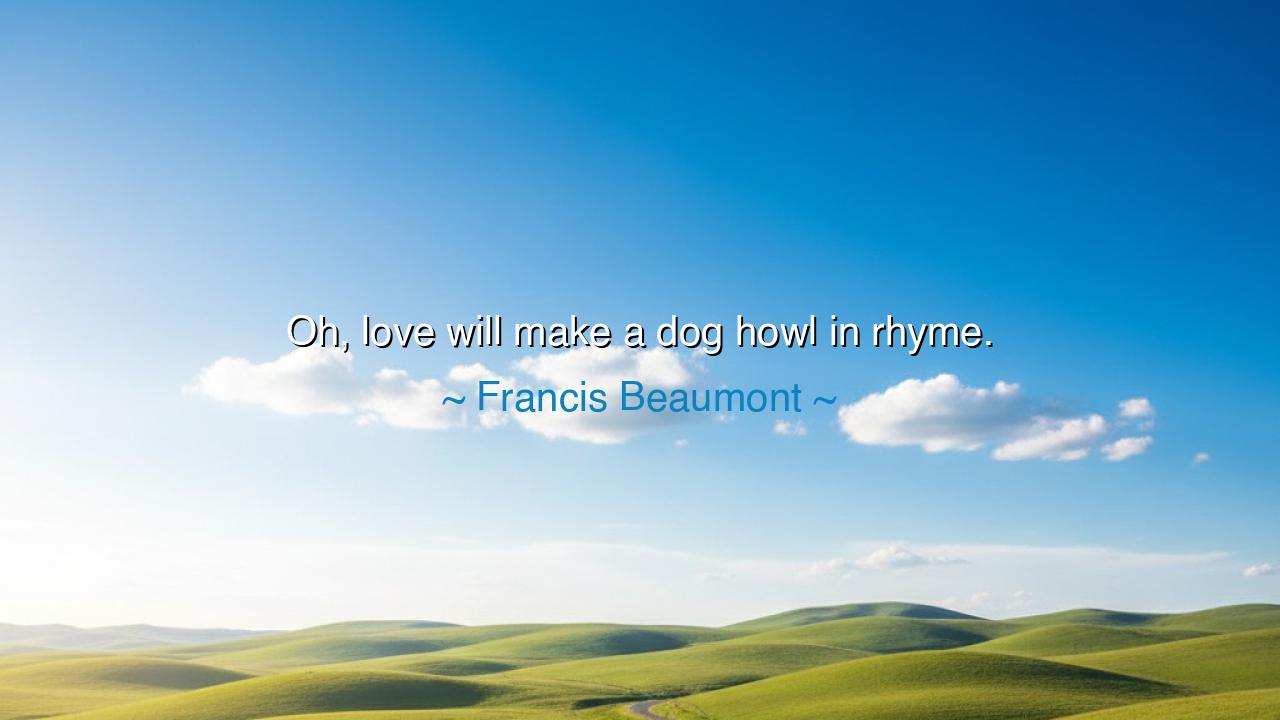
Oh, love will make a dog howl in rhyme.






“Oh, love will make a dog howl in rhyme.” — Francis Beaumont
In this vivid and playful line, Francis Beaumont, the English dramatist of the early seventeenth century, captures the wild and transformative nature of love — that mighty force which humbles kings and exalts beggars, that turns even the most unlikely creature into a poet. When he writes that love will make a dog howl in rhyme, he speaks not of foolishness alone, but of the strange alchemy by which love elevates the ordinary into the extraordinary. Love, once it seizes the heart, changes the very nature of being. It stirs the soul so deeply that even pain finds rhythm, and even longing learns to sing.
Beaumont, who lived in an age of both wit and wonder, saw love as a force that dissolves reason and awakens passion. The dog in his line is not an insult, but a symbol of raw, unrefined nature — the common creature of instinct and need. Yet, under the spell of love, even such a being finds voice in beauty. His howling becomes music; his cries become verse. In this way, Beaumont reveals that love ennobles all it touches, that even the most unpolished heart can glow with poetry when kindled by affection. It is as if the universe itself conspires with the lover, turning his pain into song.
Across centuries, the truth of this saying has been proved again and again. Consider Ludwig van Beethoven, that tempestuous soul of music. When love eluded him, when longing burned within him unfulfilled, he did not sink into silence — he composed. His pain gave birth to the Moonlight Sonata, that haunting melody which still carries the cry of his heart. Was it not love that made him “howl in rhyme”? For what are his symphonies but the human heart speaking its truth in rhythm and harmony? Thus, Beaumont’s jest carries divine wisdom: love makes poets of us all.
In the realm of history and myth, too, this truth resounds. Tristan and Isolde, lovers bound by fate, drank a potion that made their hearts one. Though their love brought sorrow and doom, their story became immortal, retold in songs and legends for a thousand years. Their suffering, transformed by love’s power, became beauty. This is the miracle that Beaumont hints at — that even anguish, when born of love, takes on grace and becomes something to cherish. Love redeems even the howl of despair, turning it into a hymn to the divine.
But why does love hold such power? Because it awakens what is deepest within us. It reminds the soul of its origin — of the unity from which all things sprang. To love is to remember that we are not complete alone. That ache, that longing, that restless stirring, is the echo of creation itself. And so, when love enters, we become as madmen, poets, dreamers, saints — or dogs howling to the moon. For love does not ask permission; it transforms without warning, commanding even the lowliest creature to lift its voice in song.
Yet, this transformation is not without cost. Love strips away pride and armor. It lays the heart bare, teaching us humility through joy and sorrow alike. But what a blessing this is — to feel so deeply that even our pain becomes art! When Beaumont writes that love will make a dog howl in rhyme, he reminds us that vulnerability is the price of wonder. To love is to risk foolishness, yes, but it is also to touch eternity. Better the howling heart that loves, than the silent soul that feels nothing.
So take this lesson, O traveler through life: do not fear the madness of love. Let it make you sing, weep, stumble, and rise again. Let it fill you with words you never knew you carried, and courage you never thought you possessed. If your love brings pain, let that pain become poetry. If it brings joy, let that joy overflow into kindness. For love’s song, whether sung in sorrow or delight, is the one music that gives meaning to all existence.
And when at last you hear yourself howling at the moon — trembling, foolish, yet alive — remember Beaumont’s wisdom: love transforms even the lowest creature into a poet. In that howling, there is truth. In that rhythm, there is beauty. And in that surrender, there is the very heartbeat of the divine.






AAdministratorAdministrator
Welcome, honored guests. Please leave a comment, we will respond soon